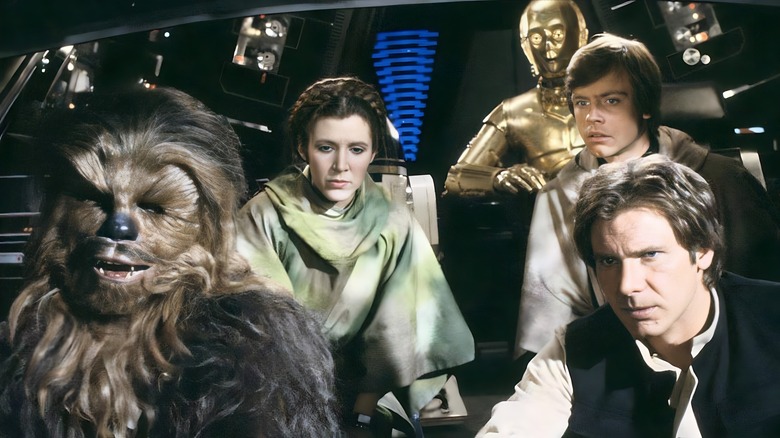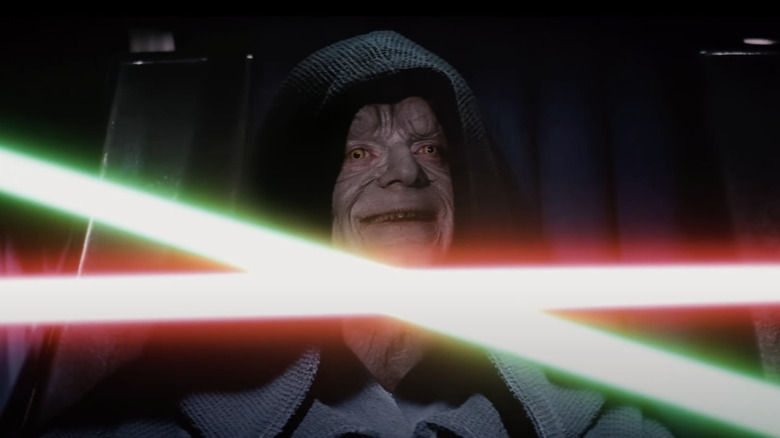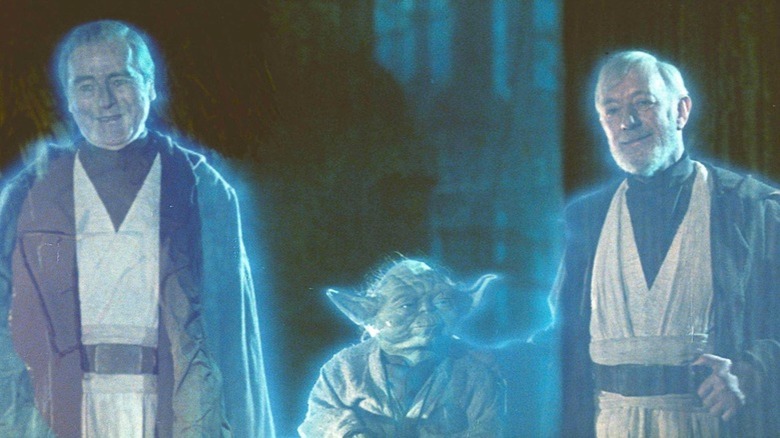Pre-Production On Return Of The Jedi Was Hamstrung By A 'Very, Very Late' Script
Tentpole filmmaking is a feat that requires the clicking together of many moving pieces. All of the departments — set design, costumes, locations, etc. — must blend together in pre-production to ensure the rest of the production runs as smoothly as possible. This becomes quite a challenge when there isn't a finished screenplay.
Contrary to the current posturing of the Alliance of Motion Picture and Television Producers, screenwriters are the most essential element of every movie. Without them, there is no dialogue and no story. This is a stupefyingly obvious fact, but every time studios, networks and, now, streamers have to reckon with fairly compensating the people who generate their precious "content," they plead poverty and downplay the contributions of their most essential workers.
You shouldn't need an example to drive this home, but film history is riddled with them. Take, for instance, "Star Wars: Episode VI — The Return of the Jedi," where a slow-to-congeal script caused loads of headaches for George Lucas, producer Howard Kazanjian, and multiple department heads.
A script as incomplete as its Death Star
The conclusion of the "Star Wars" original trilogy was far, far from settled as the film began pre-production. The movie was scheduled to begin principal photography on January 13, 1982, but the writing brain trust (George Lucas, Lawrence Kasdan, David Webb Peoples, and director Richard Marquand) were at odds on certain specifics (Kasdan, for example, favored a more dour finale where Han Solo gets killed at the beginning of the third act, and an emotionally drained Luke Skywalker staggers off into the sunset by himself).
According to John Phillip Peecher's "Star Wars — The Making of Return of the Jedi," co-producer Jim Bloom and production designer Norman Reynolds scouted locations based on the story outline. They knew Endor was a forest-rich moon and that Jabba's habitat in Tatooine had to exist on the edge of massive sand dunes. Sets were being built in London, but an outline is not a screenplay. The individual scenes, the dialogue, the moments ... none of that was there.
As production supervisor Robert Watts told Peecher:
"The screenplay is the blueprint for everything, and without it you do tend to flounder a bit. We'd had indications, we'd had discussions, we'd had drafts, but the final script did come very, very late. It means that sometimes you build things because you cannot wait on certain decisions that are later changed. Then when you get the go-ahead on the final script, you incur an immense amount of overtime, which is expensive, but somehow you make it. It did happen this time, but not to an enormous extent."
The triumphant return of Kazanjian
With 10 weeks to go until the start of principal photography, there still wasn't a finished script. Given that "Return of the Jedi" promised to be the most complicated undertaking of the three movies, the entire production was gripped with anxiety. During a department heads meeting in early November 1981, Howard Kazanjian, who was headed to California to huddle with the writers, attempted to ease nerves by promising, "If I don't come back with a script, I won't come back."
Kazanjian was a man of his word. When he returned to London 10 days later, he was in possession of an actual, completed screenplay — although, due to security concerns, only three copies of the script were made (with department heads receiving only the pages they needed to complete their work). George Lucas understood the need for a finished draft perhaps better than anyone. As he once said, "It's like riding a freight train at about 120 mph and having the guys trying to build the track in front of you as you go."
But a writer's work isn't done once the script is up on its feet. There will be on-set adjustments and new dialogue. It's amusing and more than a little insulting that the AMPTP thinks they can knock out watchable movies and TV shows without writers on set. The movie starts on the page, and it gets refined on set by the only people on Earth who can do what they do. Pay your writers, and pay them well.


